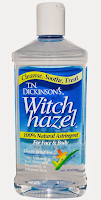Products with alcohol. Not all alcohol is bad; it is primarily SD, ethyl, and isopropyl (rubbing) alcohol that are not good to use on your skin. Alcohol merely puts out the fire, so to speak, but does nothing to douse the origination of the flame. It causes dry skin to form in and around the affected pore or pores where it was applied, which can cause problems of its own. Although drying something up seems to be effective, it is simply a temporary fix and is not part of a real solution for ending your breakouts.
Witch hazel found in most stores
contains roughly 15% ethyl alcohol. So although it is
not pure alcohol, it still contains some bad alcohol nonetheless. This
type of witch hazel and its accompanying alcohol should be avoided,
especially as a main
ingredient in a product. Hamamelis virginiana is the actual plant name for what we call witch hazel. This extract is actually a good
ingredient and can be helpful to reduce swelling and inflammation.
Unfortunately it is usually mixed with ethyl alcohol, which is a skin care no-no.
 Benzoyl peroxide is a popular ingredient in
many products for problem skin. Go to any grocery or drug store and there
are numerous “oxy” products lining the shelves, waiting for unsuspecting
customers to take them home—only to find they usually don’t work.
Benzoyl peroxide is antibacterial, which is good. But it is also a skin
irritant and can cause dryness, sensitivity, and irritation, which is
bad. You want to soothe and heal your blemishes, not irradiate them by
using a nuclear bomb!
Benzoyl peroxide is a popular ingredient in
many products for problem skin. Go to any grocery or drug store and there
are numerous “oxy” products lining the shelves, waiting for unsuspecting
customers to take them home—only to find they usually don’t work.
Benzoyl peroxide is antibacterial, which is good. But it is also a skin
irritant and can cause dryness, sensitivity, and irritation, which is
bad. You want to soothe and heal your blemishes, not irradiate them by
using a nuclear bomb!
Fragrance as a skin care product ingredient can cause problems with
many peoples’ skin. Even fragrance worn as perfume can cause allergic
reactions in a large percentage of the population. Fragrance is an ambiguous term. It is similar to natural flavoring
in foods. What is the fragrance made of? I have seen many decent,
natural face products that employ fragrance in their formulations. This
can ruin an otherwise good product. Fragrance can also cause big
problems with your skin. Allergy to fragrance is one of the most common
reasons someone cannot use a particular skin care product. Watch out for
this ingredient.
If you are currently using bar soap, try switching to a liquid soap or face wash. Sometimes these, too, will be alkaline, so testing with pH papers is always the best way to find the right cleanser for you. Because alkalinity strips all the oil and water off your face, your oil glands may overproduce to compensate for the loss, which can cause oiliness, dehydration, as well as breakouts.
 Although not an ingredient in skin care products, the trace mineral iodine
is known to cause breakout in some people. And I happen to be one of
those people sensitive to this vital mineral. I know this because in the
past I have taken kelp tablets, high in iodine, and every time I do my
skin starts to break out.
Although not an ingredient in skin care products, the trace mineral iodine
is known to cause breakout in some people. And I happen to be one of
those people sensitive to this vital mineral. I know this because in the
past I have taken kelp tablets, high in iodine, and every time I do my
skin starts to break out.One time I experimented to see if it was indeed the kelp that was disturbing my skin. I stopped taking the kelp, let my skin clear up completely, then once again starting taking kelp tablets while not changing anything else in either my diet or my skin care routine. Sure enough, my skin started reacting by breaking out. Therefore taking kelp tablets as an easy way to get iodine is just not for me. Although important for a healthy-functioning thyroid, iodine is easy to get through foods, namely fish, and seaweeds (high in kelp).
Having gone through a bit of a struggle in perimenopause with my energy levels (having to do with adrenals glands and also thyroid), I do have a bit more insight into iodine and other supplements that can help keep your body functioning optimally. This will be discussed in a future post.
For more helpful information, see:




